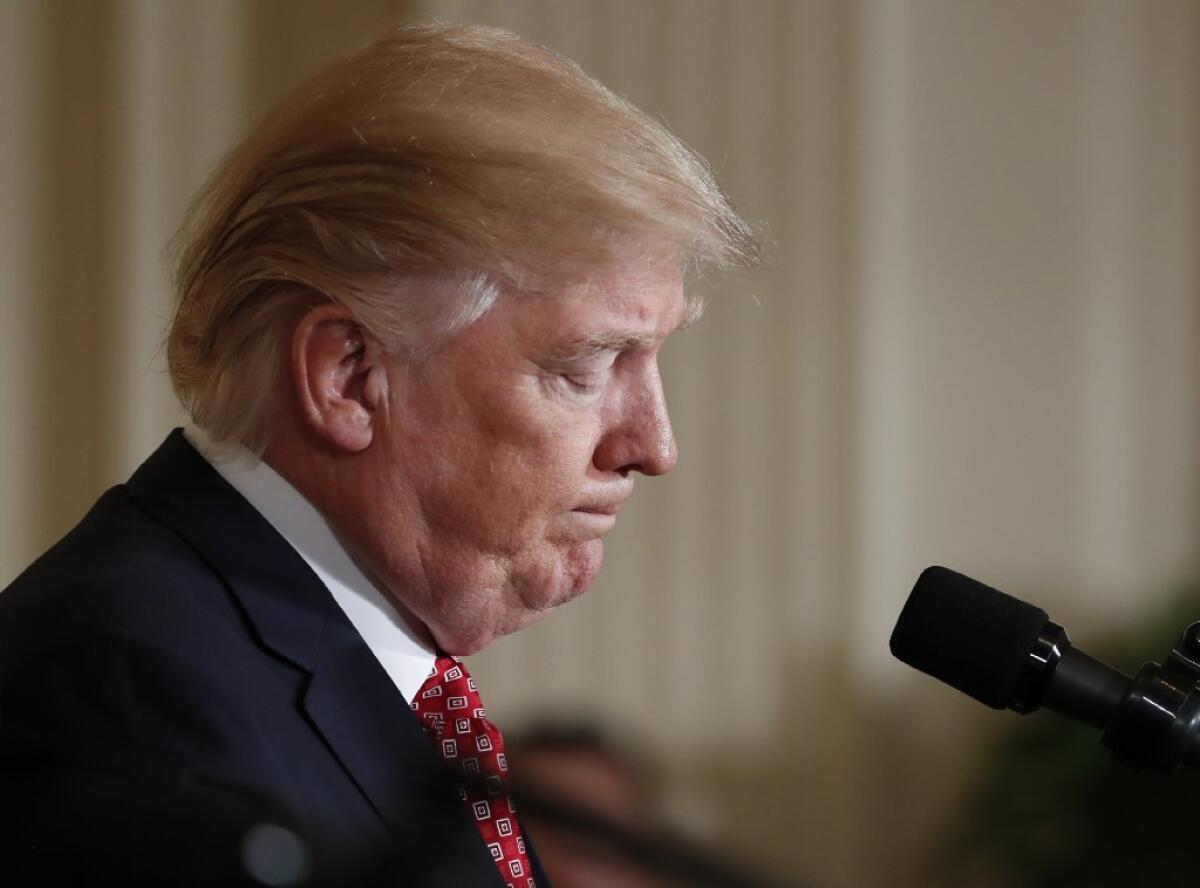Opinion: Courts shouldnât try to plumb the âoriginal intentâ of Trumpâs travel ban

In its opinion refusing to reinstate President Trumpâs executive order limiting travel and immigration, the U.S. 9th Circuit Court of Appeals didnât find it necessary to rule â even in the context of an application for a stay of a restraining order â on whether the order amounted to an unconstitutional establishment of religion in violation of the 1st Amendment. The claim that the order violated due process was enough to justify preventing it from going into effect.
But the three-judge panel nevertheless suggested that the executive order might be vulnerable to a religious discrimination claim based on Trumpâs statements on the campaign trail. As is well known, in December 2015 Trump advocated a âtotal and complete shutdown of Muslims entering the United States until our countryâs representatives can figure out what the hell is going on.â
Later Trump replaced that blatant religious test with a proposal for âextreme vettingâ of immigrants, refugees and visitors from areas with a history of terrorism. His Jan. 27 executive order suspended for 90 days the entry of persons from seven majority-Muslim countries: Iraq, Iran, Libya, Somalia, Sudan, Syria and Yemen. The order also gave priority to refugees fleeing religious persecution if they belonged to a âminorityâ religion â a preference that would benefit Christians in predominantly Muslim nations.
This, Trumpâs critics say, is the campaignâs âMuslim banâ in disguise. And the 9th Circuit seemed to suggest that, when the judiciary reached the merits of the lawsuit, it might agree. The court said:
âThe states [of Washington and Minnesota] argue that the executive order violates the Establishment and Equal Protection Clauses because it was intended to disfavor Muslims. In support of this argument, the states have offered evidence of numerous statements by the president about his intent to implement a âMuslim banâ as well as evidence they claim suggests that the executive order was intended to be that ban . . . It is well established that evidence of purpose beyond the face of the challenged law may be considered in evaluating Establishment and Equal Protection Clause claims.â
Trumpâs executive order is unjustified and ought to be rescinded, and his original proposal for a âtotal and complete shutdown of Muslimsâ was outrageous.
But it would be a mistake for the courts to equate the executive order with the original Muslim ban, and not only for the obvious reason that itâs literally not a ban on Muslims. (It applies to non-Muslim citizens of the seven countries and doesnât apply to citizens of other predominantly Muslim countries, including Saudi Arabia and Indonesia.)
The bigger problem is that the 9th Circuit seems to float the idea that Trumpâs âoriginal intent was to go after Muslims because they were Muslims â that is, that he was animated by religious hatred.
Itâs far more likely that Trump was engaging in what lawyers would call over-inclusive thinking: The terrorists he was concerned about were Muslims, so he decided to âerr on the safe sideâ and ban all Muslims. It was an idiotic as well an offensive impulse. After smarter people pointed that out to him, he backed down and adopted a more targeted strategy. (That the strategy wasnât targeted enough doesnât mean that it was a violation of the 1st Amendment.)
If the Jan. 27 executive order is no different from a âtotal and complete shutdown of Muslimsâ because we know what Trump âreallyâ intended, the same would be true of any revised executive order, even if were justified by the sort of evidence that wasnât adduced to justify this order. That would mean that Trump would be held hostage by his own careless campaign rhetoric, prevented from imposing any restrictions on immigration from predominantly Muslim countries for the rest of his term.
Finally, although Trump is unique among modern presidential candidates in openly promising to bar every member of an entire religion from an entering the United States, other politicians also make outlandish statements on the campaign trail that judges might use to deconstruct the more prudent policies the politicians pursued once they were in office.
As Eugene Kontorovich pointed out in the Washington Post: âThe 9th Circuitâs ruling âŚthrows open a huge door to examinations of the entire lives of political officials whose motives may be relevant to legal questions. This introduces more uncertainty and judicial power into legal interpretation than even the most robust use of legislative/administrative history. Without a clear cutoff at assumption of office, attacks on statutes will become deep dives into politiciansâ histories.â
The words of Trumpâs executive orders will give courts enough work to puzzle over; they donât have to sift through his campaign speeches.
Follow the Opinion section on Twitter @latimesopinion and Facebook
More to Read
A cure for the common opinion
Get thought-provoking perspectives with our weekly newsletter.
You may occasionally receive promotional content from the Los Angeles Times.











